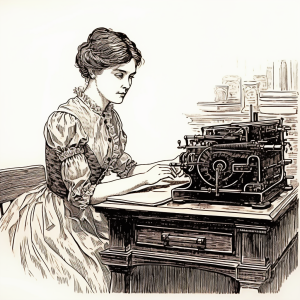CHAPTER II.
AT WORK IN A “SANITARY LAUNDRY.”
An atmosphere thick with steam and the odour of boiling soap-suds greeted me Tuesday morning, when I arrived at the Y—— and Z—— Sanitary Laundry to take my situation as a “learner.” Ironing-machine, wringer, and mangle were revolving at a rapid rate, propelled by the large engine. Water was sputtering from the boilers in which the clothes were being washed; a dozen girls and women were ironing, others were starching, sprinkling, or folding clothes, and a solitary water-soaked individual presided in one corner over some wash-tubs, applying a scrubbing-brush to clothes that could not be put into the machines. All the work was done in one immense room, floored over with cement, which was a succession of hills and hollows, more dangerous in aspect than any American pavement. One side of the room was taken up with an ironing-machine and ironing-tables, the other side with the engine, boilers, wringer, mangle, and wash-tubs. A corner, in the vicinity of the engine, was floored over with some boards, and fitted up with crude-looking tables and a half-dozen large boxes. It was called the “sortingroom,” and it was there that I was conducted by Mrs. Morris when I had removed my coat and hat and donned my working costume. Between the door and the sorting corner there stretched a large body of soapy water, several yards square, and in some places almost ankle-deep.
“Pick your skirts up,” said Mrs. Morris, as she prepared to lead me across. I was on the point of asking for a boat and ferryman, when I saw her step into the water and walk bravely over; so, acting on the principle that the employee was no better than the employer, I also walked across, and landed with wet feet. I supposed that, of course, there had been an accident, that one of the boilers had turned upside down ; but I was afterwards told that the pond was always there. It was let out from the washing-machines in which the linen was boiled, and allowed to flow about the place until it found its way to a small sewer underneath a board, where it sunk into the ground, and its place was taken by more water from the next boiler of clothes. Taking into consideration the fact that I was in a ” sanitary ” laundry, it was only natural that I should have been surprised that there were no pipes for the purpose of carrying off this water.
In the sorting-corner I was introduced to Miss Stebbins, the head packer and sorter, a position considered to be the most genteel in the business. It was there that I spent the first three days of my apprenticeship.
Until I was set to making figures with red cotton I had never thought of connecting needlework and laundry work. I had supposed my career as a needlewoman was ended when, just before I left Mrs. Allison’s, I darned up the contents of the mending-basket; but darning was as nothing compared with the making of figures with red cotton. With constantly-pricked fingers and agitated temper, I tried my best to stitch into the linen the numbers that Miss Stebbins instructed me to make, and, after much perseverance, I succeeded in learning all the figures except 5 and 6. Those two I would never have learned to make had not Janie, one of the girls, come to my assistance.
Janie was a sort of general utility maid for the place. She was short and slightly lame, and one shoulder was somewhat lower than the other. Her face had a strangely-combined expression of childhood and womanhood upon it. She had large, wandering blue eyes that looked glad and sad by turns; and her hair hung down her back, half-braided, half-loose, after the fashion of the young girls who live in the East-End. She was an illustration of perpetual motion. She rarely sat down, and seldom stood still. There was an indescribable something about her that made her seem oddly at variance with her surroundings. She looked as if she should have painted pictures or made music for the world, instead of living in and breathing an atmosphere of soap-suds.
It was towards the end of the second day, when I had been vainly endeavouring to embroider the figure 6 on the corner of a serviette, that Janie came over to the sorting corner and accosted me with— ” Hi’ll ‘elp you, Miss Barnes.” She took my thimble and needle, and her nimble fingers soon worked out not only one 6 but a dozen of them on a piece of calico she picked up from the floor. She did not sit down, and her feet kept up a rat-tat-tat on the boards while she gave me my lesson.
When five o’clock came, and the girls were allowed a half-hour for tea, Janie invited me over to the other side of the room to share the large pot of tea that she had made for herself and older sister, who was one of the ironers, and at the rate of five farthings a shirt was sometimes able to earn three-and-six a day— more money than any other woman in the laundry was capable of earning. She poured the tea from the rusted pot into a thick cup minus a handle, and ordered me to drink it quickly, so that she might also have her tea, for there were only two cups for the three persons. Never medicine was more difficult to swallow than Janie’s tea. It tasted stale, and strong, and bitter, although quantities of queer-looking brown sugar had been put into it; but I drank it down heroically.
During this half-hour the ironing-boards were turned into tea-tables, and, as Mr. and Mrs. Morris had gone into the house, which adjoined the laundry, for their own tea, the workers had a few minutes for social intercourse. A dark-skinned, demure-looking girl sat on a box by the collar-machine, over which she presided during working hours, and read the Church Missionary Intelligencer and Church Missionary Gleaner, while she sipped her tea. Janie whispered to me that it was Annie Martin, who was very religious, and wanted to become a missionary, but, on account of a defective education, was unable to pass the examination that was required.
Janie’s sister munched her bread-and-butter and read a penny novel at the same time; while Mrs. Bruckerstone, one of the older women, entertained the assemblage by giving a practical illustration of the difference between “piece-work” and “daywork.” She showed how, in doing piece-work, where the number of articles ironed governed the amount of pay, the worker moved about briskly and eagerly. Then, in illustration of day-work, she picked up an apron, shook it out, smoothed it on the board, patted it down, and took her time over ironing it. During that half-hour I became acquainted with all the women in the place, and was surprised to find that they were not at all like the description I had always heard of laundry-girls. I heard no profanity, no bad language, and no quarrelling. With the exception of a few older women, most of them were girls between the ages of fifteen and twenty-five. However, Janie told me that the girls employed in the Y—— and Z—— Laundry were superior to those engaged in the surrounding laundries. It seems they did scratch, and fight, and swear in a laundry only a mile distant; but Mr. and Mrs. Morris made it a point to keep their place rather “select” as regarded the characters of their employees.
When Janie and I returned to the marking, she regaled me with an account of all the accidents to which girls working in steam laundries were liable, and this in no way added to my peace of mind. It appeared that boilers sometimes blew up, although they had never done so in the Y—— and Z—— Laundry ; leather belts flew off the wheels and hit the bystander’s eyes; fingers were mashed, and sometimes clipped off, in working at the mangle and wringer. Only recently one of the girls had been taken away to the hospital, where she had been obliged to have three of her fingers amputated, because they had slipped into the rubber rollers of the wringer. But Janie declared this affair was all due to carelessness, as the girl was looking about and talking, instead of attending to her work. One of Janie’s fingers, I noticed, was flattened, but it had not been done at the laundry. She had been chopping wood, and hit it with an axe.
“Hi’m always in the wars, Miss Barnes,” said she. “When Hi were a baiby, Hi were dropped on the paivement, and the bruise went hinside instead of hout. That’s what maikes me laime.”
“How did you get the scar on your forehead ?” I asked.
“Hi fell on the fender.”
Poor little Janie! she really had been through the wars. If there was any trouble with the girls or the customers, she was always sent to make it right. If anything got lost, she must hunt until she found it, though having nothing to do with the losing of it. If delinquent customers refused to pay their bills, Janie was sent to make the collections, and usually returned with the money. A few days before I went to the laundry, Janie had, in packing the clean clothes, mixed the tablecloths of two customers, who, it happened, were near neighbours and deadly enemies. Janie, finding out her mistake, went to rectify it, and one of the neighbours, thinking the exchange had been made purposely, took Janie and shook her until she was at last obliged to drop the tablecover she had brought and run back to the laundry for dear life.
“Don’t you get tired, running about so much from eight in the morning until eight at night ? ” I asked her one day, when she had just come in from collecting long-overdue accounts.
“No; Hi’m never tired. Hi like to work all the time. Hi don’t like Sundays, because Hi ‘av’ to be quiet.”
“Don’t you like to read on Sunday?” I asked her.
“Yes, sometimes. Hi always reads the People and the Quiver; but Hi’d rather work.”
I was beginning to get intensely interested in this strange species of laundry-girl, who, as she one day told me, would be “haighteen years hold in Haugust,” and was earning “haight” shillings a week. At first I was scarcely able to understand the Cockney dialect over which she was complete mistress; but by degrees I became accustomed to it, and I was really in danger of getting to talk Cockney myself. Several times I discovered her looking curiously at me, and one day she asked me if I had had much “schooling.” I answered that I did not know as much as I wished I did; and she began to consider how she might help me.
“When Hi first saw you, Miss Barnes,” said she, “Hi said to myself,’ She’s a nice young —'” There Janie stopped, and was lost in meditation. I had half-expected she was going to speak of me as a “young lady ;” but no. She appeared to be thinking for a time as to what was the correct word, and then she ended with “person”! However, I had become used to being called a “young person ” when I was in service, so I took no offence at Janie’s disinclination to place me out of what might be my proper sphere.
On Thursday I was wondering what could have become of the clothes I had sent to the laundry, when Janie unpinned a parcel, and informed me that it had been sent by a new customer, and all the pieces needed marking. They were my own personal property.
“There ought to be some other way of marking clothes, especially the fine ones,” I said, as I picked up my best new handkerchief and proceeded to number it. Janie insisted that red cotton could not hurt anything, but I was of a different opinion. It stood to reason that the coarse cotton must soon tear holes in fine linen, but Janie declared that everything must be marked, and she concluded that as it was for a new customer, and she wanted it done nicely, she had better do it herself.
The system of identifying the different articles at the London laundries might certainly be improved. In America the Chinamen have a way of attaching labels by a single thread, which is cut after the clothes have been ironed. This is certainly a much better plan than the use of the disfiguring and ruinous red cotton, although even this trouble might be avoided if all clothes were stamped with the owner’s full name before being sent to the laundry.
I one day asked Janie why the place was called a “sanitary laundry.” From what I had seen of the Y—— and Z—— Laundry, I could not discover that it was intended to have any very sanitary effects upon the girls that were employed there. Janie thought it was probably sanitary because it was worked by steam, and no chemicals were used. Other laundries used chloride of lime and carbolic acid to whiten the clothes, but the Y—— and Z—— people avoided everything but soda and soap. However, this explanation was hardly satisfactory to me, especially as every morning, and several times during the day, I was obliged to walk through the water from the boilers, and I was getting a sore throat in consequence. It seemed to me there should have been some outlet for the steam, which was sometimes nearly suffocating, and must surely affect the health of the girls, though when I complained of it they assured me I would get used to it in time, and would not notice it. The one room served not only for a laundry, but a small portion of it was used for stabling purposes for the two horses that hauled the delivery waggons. Amid the din of the machinery and the whizzing of the steam, the sound of their pawing and neighing could be heard. When they were taken to and from the waggon, they walked directly through the laundry door, and indeed their so-called stable was only partitioned off on one side, and they were in plain sight all the time. The poor animals must have suffered intensely from the steam and heat of the place. And all this in a “sanitary laundry”!
I will admit that I did not hear any of the girls complain of the inconveniences I have mentioned. They probably saw nothing incongruous in a laundry and stable combined in one! But I am sure that, had the poor beasts been able to talk, they would have bad some objections to offer.
When Thursday afternoon came, I began to grow tired of marking and sorting, and I begged Mrs. Morris to let me show my skill in ironing. It was difficult to convince her that I had any talents in that direction. She thought I had better keep to the sorting for several weeks before I attempted ironing. “You must not expect to learn everything in a week. It takes months to learn anything about the laundry trade,” she said to me, after I had requested a change of occupation. I told my troubles to Janie, and she, too, laughed at the idea of my leaving off sorting when I had not worked three days. I think I must have looked particularly downhearted at this, for Janie suddenly changed her mind, and said—
“Never mind, Miss Barnes ; Hi’ll hask Mis’ Morris about it in the morning.”



